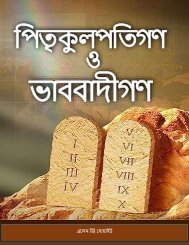Finishing the Race
Of all the games instituted among the Greeks and the Romans, the races were the most ancient and the most highly esteemed … The contests were governed by strict regulations, from which there was no appeal. Those who desired their names entered as competitors for the prize had first to undergo a severe preparatory training. Harmful indulgence of appetite, or any other gratification that would lower mental or physical vigour, was strictly forbidden. For one to have any hope of success in these trials of strength and speed, the muscles must be strong and supple, and the nerves well under control. Every movement must be certain, every step swift and unswerving; the physical powers must reach the highest mark.
Of all the games instituted among the Greeks and the Romans, the races were the most ancient and the most highly esteemed … The contests were governed by strict regulations, from which there was no appeal. Those who desired their names entered as competitors for the prize had first to undergo a severe preparatory training. Harmful indulgence of appetite, or any other gratification that would lower mental or physical vigour, was strictly forbidden. For one to have any hope of success in these trials of strength and speed, the muscles must be strong and supple, and the nerves well under control. Every movement must be certain, every step swift and unswerving; the physical powers must reach the highest mark.
You also want an ePaper? Increase the reach of your titles
YUMPU automatically turns print PDFs into web optimized ePapers that Google loves.
of <strong>the</strong> week."--A. E. Waffle, The Lord's Day, pages 186-188. Roman Catholics<br />
acknowledge that <strong>the</strong> change of <strong>the</strong> Sabbath was made by <strong>the</strong>ir church, and declare that<br />
Protestants by observing <strong>the</strong> Sunday are recognizing her power. In <strong>the</strong> Catholic Catechism<br />
of Christian Religion, in answer to a question as to <strong>the</strong> day to be observed in obedience to<br />
<strong>the</strong> fourth commandment, this statement is made: "During <strong>the</strong> old law, Saturday was <strong>the</strong> day<br />
sanctified; but <strong>the</strong> church, instructed by Jesus Christ, and directed by <strong>the</strong> Spirit of God, has<br />
substituted Sunday for Saturday; so now we sanctify <strong>the</strong> first, not <strong>the</strong> seventh day. Sunday<br />
means, and now is, <strong>the</strong> day of <strong>the</strong> Lord."<br />
As <strong>the</strong> sign of <strong>the</strong> authority of <strong>the</strong> Catholic Church, papist writers cite "<strong>the</strong> very act of<br />
changing <strong>the</strong> Sabbath into Sunday, which Protestants allow of; . . . because by keeping<br />
Sunday, <strong>the</strong>y acknowledge <strong>the</strong> church's power to ordain feasts, and to command <strong>the</strong>m under<br />
sin."--Henry Tuberville, An Abridgment of <strong>the</strong> Christian Doctrine, page 58. What <strong>the</strong>n is <strong>the</strong><br />
change of <strong>the</strong> Sabbath, but <strong>the</strong> sign, or mark, of <strong>the</strong> authority of <strong>the</strong> Roman Church--"<strong>the</strong><br />
mark of <strong>the</strong> beast"?<br />
The Roman Church has not relinquished her claim to supremacy; and when <strong>the</strong> world<br />
and <strong>the</strong> Protestant churches accept a sabbath of her creating, while <strong>the</strong>y reject <strong>the</strong> Bible<br />
Sabbath, <strong>the</strong>y virtually admit this assumption. They may claim <strong>the</strong> authority of tradition and<br />
of <strong>the</strong> Fa<strong>the</strong>rs for <strong>the</strong> change; but in so doing <strong>the</strong>y ignore <strong>the</strong> very principle which separates<br />
<strong>the</strong>m from Rome--that "<strong>the</strong> Bible, and <strong>the</strong> Bible only, is <strong>the</strong> religion of Protestants." The<br />
papist can see that <strong>the</strong>y are deceiving <strong>the</strong>mselves, willingly closing <strong>the</strong>ir eyes to <strong>the</strong> facts in<br />
<strong>the</strong> case. As <strong>the</strong> movement for Sunday enforcement gains favour, he rejoices, feeling<br />
assured that it will eventually bring <strong>the</strong> whole Protestant world under <strong>the</strong> banner of Rome.<br />
Romanists declare that "<strong>the</strong> observance of Sunday by <strong>the</strong> Protestants is an homage <strong>the</strong>y<br />
pay, in spite of <strong>the</strong>mselves, to <strong>the</strong> authority of <strong>the</strong> [Catholic] Church."--Mgr. Segur, Plain<br />
Talk About <strong>the</strong> Protestantism of Today, page 213. The enforcement of Sunday-keeping on<br />
<strong>the</strong> part of Protestant churches is an enforcement of <strong>the</strong> worship of <strong>the</strong> papacy--of <strong>the</strong> beast.<br />
Those who, understanding <strong>the</strong> claims of <strong>the</strong> fourth commandment, choose to observe <strong>the</strong><br />
false instead of <strong>the</strong> true Sabbath are <strong>the</strong>reby paying homage to that power by which alone it<br />
is commanded. But in <strong>the</strong> very act of enforcing a religious duty by secular power, <strong>the</strong><br />
churches would <strong>the</strong>mselves form an image to <strong>the</strong> beast; hence <strong>the</strong> enforcement of Sundaykeeping<br />
in <strong>the</strong> United States would be an enforcement of <strong>the</strong> worship of <strong>the</strong> beast and his<br />
image.<br />
But Christians of past generations observed <strong>the</strong> Sunday, supposing that in so doing <strong>the</strong>y<br />
were keeping <strong>the</strong> Bible Sabbath; and <strong>the</strong>re are now true Christians in every church, not<br />
excepting <strong>the</strong> Roman Catholic communion, who honestly believe that Sunday is <strong>the</strong> Sabbath<br />
of divine appointment. God accepts <strong>the</strong>ir sincerity of purpose and <strong>the</strong>ir integrity before Him.<br />
But when Sunday observance shall be enforced by law, and <strong>the</strong> world shall be enlightened<br />
concerning <strong>the</strong> obligation of <strong>the</strong> true Sabbath, <strong>the</strong>n whoever shall transgress <strong>the</strong> command of<br />
God, to obey a precept which has no higher authority than that of Rome, will <strong>the</strong>reby honour<br />
281


















